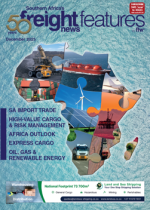In today's world, where businesses aim to be quick and efficient globally, the express sector is undergoing significant changes. There's a growing need for dependable transportation that covers everything from start to finish. This shift shows that companies understand the importance of transporting goods efficiently and industry leaders are now developing new ideas to meet these changing needs.According to Natasha Parmanand, managing director for operations in Sub-Saharan Africa at Fed-Ex, e-commerce has been a significant driver of change. Even in Africa, where e-commerce adoption has faced some unique challenges, contributing to slower growth compared to other regions, there will be more than 500 million users by the end of 2025."The Word Economic Forum's International Trade Centre estimates that there are already around 264 e-commerce start-ups running in Africa and predicts that e-commerce will create around three million jobs on the continent a lone."She said this required an entire paradigm shift for express courier companies. "In the logistics sector, we are going to have to adapt how we do business," she said during a Transport Forum presentation.Carsten Schubert, COO and co-founder of Transnova , agreed that changing customer preferences and increased customer service expectations, with a heightened focus on the environment, sustainability and governance, and the demand for omnichannel experiences were driving change."Shippers worldwide are increasingly outsourcing supply chain activities but still want the same or even better control and visibility. Agility and reliability have become key factors for logistics service providers," he said.According to Schubert, despite companies' challenges, there is now a chance to enhance their services. It's crucial to clearly understand the entire process, minimise risks, and focus on customer satisfaction through strategies like near-shoring and dual-sourcing. He said that improved cooperation between customers and suppliers was necessary for more resilient supply chains. Additionally, a significant rise in adopting advanced digital technologies is anticipated, leading to better customer service and shorter operating times.Parmanand and Schubert said logistics companies would have to invest in technology and infrastructure to remain relevant.Trade integration profoundly impacted the logistics sector and would continue to result in increased volumes and complexity, Parmanand added."Global trade matters, and it is here to stay," said John Pearson, CEO of DHL Express, which has also opted to increase its investment in its global hubs. He said while international trade was continuing to normalise following the pandemic, cross-border trade was growing, driven by e-commerce. There was also a continued increase in air cargo.Parmanand said rates were also stabilising, and the company had seen rates come down in the airfreight sector. "Looking at the latest cargo trends available, which are for 2022, it is clear that the trade landscape locally is also changing. We are seeing South Africa move from an import-heavy landscape to increased exports. Yes, the margins are still quite slim, but it is important to note the shift in dynamics. Global networks have diversified more since Covid-19, while trade barriers are decreasing. Small to medium businesses are taking off, and the demand for logistics services is growing."
E-commerce drives change in Africa
12 Dec 2023 - by -
0 Comments
December 2023 Compendium

12 Dec 2023
12 Dec 2023
12 Dec 2023
12 Dec 2023
12 Dec 2023
12 Dec 2023
12 Dec 2023
12 Dec 2023
12 Dec 2023
